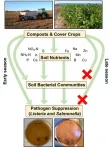Family child care home providers with high diet self-efficacy are better equipped to manage stress
For individuals who care for other people's children in their home, building self-efficacy for healthy eating is an important component of health promotion and can buffer the impact of stress on diet quality, Journal of Nutrition Education and Behavior
2021-04-07
(Press-News.org) Philadelphia, April 7, 2021 - Building family child care home providers' (FCCH) self-efficacy--an individual's belief in their ability to manage their situation--for healthy eating is an important component of health promotion and can buffer the impact of stress on their diet quality, according to a new study in the Journal of Nutrition Education and Behavior, published by Elsevier.
"The FCCH provider is an important source of child care in this country. A lot of families from lower-income environments use the FCCH because of its affordability and location," said Dianne Ward, EdD, of the Department of Nutrition, Gillings School of Global Public Health, University of North Carolina at Chapel Hill, Chapel Hill, NC, USA.
FCCH providers can experience multiple stressors including work-life balance, lack of social support from other early care and education professionals, and difficulties managing all aspects of both child care and business operations, often with little to no assistance.
To understand the potential determinants of the health of FCCH providers, a group at risk for high stress, poor sleep, and obesity, researchers examined stress levels, sleep quality, and diet self-efficacy of 166 licensed FCCH providers over the age of 18 from central North Carolina.
The study's results showed diet self-efficacy moderating the FCCH provider stress-diet quality relationship. When stress was low, diet quality was similar among individuals across all levels of diet self-efficacy. With higher stress, those with high diet self-efficacy seem to cope with the stress and have a better diet quality. In contrast, those with low diet self-efficacy seem to be negatively affected by stress and have a poorer diet quality.
"As nutrition professionals, we often get caught up in telling people what to eat. We need to remember to facilitate the how to eat. We need to give people the confidence that they can select, consume, and obtain the right food, and that if they do, they can have a healthy diet. The study underscored how important diet self-efficacy really is," noted Dr, Ward.
INFORMATION:
ELSE PRESS RELEASES FROM THIS DATE:
2021-04-07
A generation of talented but disadvantaged children are being denied access to higher education because academic success in lower and middle-income countries is continually 'protected by wealth', a study has found.
The research, which used data from around 3,500 young people in Ethiopia, India, Peru and Vietnam, shows that promising but poorer students 'fall away' during their school years, as challenges associated with their socio-economic circumstances gradually erode their potential. Among children who showed similar levels of ability aged 8, for example, the wealthiest were often over 30 percentage points more likely than the least-wealthy to enter all forms of tertiary education: including university, technical colleges, and teacher training.
Even ...
2021-04-07
Symptoms of cerebral palsy, a neurological disorder that affects a person's ability to move and maintain balance and posture, appear early during childhood. A new analysis examines the effectiveness of therapies initiated from birth until 3 years of age for children with or at risk for cerebral palsy.
The analysis, which is published in Developmental Medicine & Child Neurology, included all systematic reviews from 2009-2020 that assessed the results of relevant published studies.
Investigators concluded that research has generated limited supportive data and cannot yet confirm a greater benefit from early versus later interventions; however, earlier, ...
2021-04-07
Smoking increases symptoms and health risks for patients with rheumatic diseases, but interventions to help patients quit are rarely available at rheumatology clinics. A study published in Arthritis Care & Research has found that Quit Connect--a protocol involving electronic health record prompts for nurses and medical assistants in rheumatology clinics--can increase electronic referrals to free, state-run tobacco quite lines.
Implementing Quit Connect led to electronic referrals for 71% of patients who were identified as ready to quit, with referrals taking less than 90 seconds for medical staff to complete.
"There's a huge opportunity to address smoking as a modifiable risk factor in rheumatology patients, and Quit Connect was 26-times more effective than usual care for ...
2021-04-07
School-based interventions that target students with, or at risk of, academic difficulties in kindergarten to grade 6 have positive effects on reading and mathematics, according to an article published in END ...
2021-04-07
In a study of 558 college students, those who reported more symptoms associated with attention-deficit/hyperactivity disorder (ADHD) also reported higher levels of stress. Students reporting higher levels of ADHD symptoms also reported lower levels of resilience, according to the study published in the END ...
2021-04-07
In addition to causing blood sugar imbalances, type 1 diabetes can contribute to nerve damage and sensory abnormalities--a condition call neuropathy--and has been linked to a higher risk of bone fractures. A new study published in the Journal of Bone and Mineral Research has examined the effects of type 1 diabetes and diabetic neuropathy on the skeleton.
Investigators found that type 1 diabetes and diabetic neuropathy have various impacts on bone structure, but these effects do not fully explain the higher fracture risk in patients with type 1 diabetes.
The results suggest that the increase in the risk of fractures in type 1 diabetes ...
2021-04-07
Steroids are essential for treating children with acute lymphoblastic leukemia, a type of cancer of the blood and bone marrow, but they can cause severe side effects such as psychological reactions and sleep problems. An analysis of all relevant studies published to date indicates that there's insufficient high-quality research investigating the risk factors for these side effects.
The analysis, which is published in Psycho-Oncology, included 24 studies. The authors of the analysis noted that overall, there is little evidence regarding risk factors for steroid-induced psychological reactions and sleep problems in children with acute lymphoblastic ...
2021-04-07
In a survey-based study of 105 graduate-level counseling students who identified as Black, Indigenous, or people of color (BIPOC), investigators found that experiences of discrimination can negatively affect student overall wellbeing and lead to burnout.
The authors of the study, which is published in the END ...
2021-04-07
Foodborne disease outbreaks linked to the consumption of fresh produce have caused farmers to re-evaluate their practices. A recent analysis of a 27-year experiment comparing organic and conventional soil management indicates that animal-based composts do not promote pathogen survival and may even promote bacterial communities that suppress pathogens.
The study, which is published in the Journal of Applied Microbiology, comes following other research documenting a higher prevalence of foodborne pathogens in fields fertilized with raw animal manure compared with conventional ...
2021-04-07
The COVID-19 pandemic and the global response to it have changed many of the interactions that humans have with nature, in both positive and negative ways. A perspective article published in People and Nature considers these changes, discusses the potential long-term consequences, and provides recommendations for further research.
The authors of the article note that the pandemic constitutes a 'global natural experiment' in human-nature interactions that, without seeking to downplay or ignore its tragic consequences, provides a rare opportunity ...
LAST 30 PRESS RELEASES:
[Press-News.org] Family child care home providers with high diet self-efficacy are better equipped to manage stress
For individuals who care for other people's children in their home, building self-efficacy for healthy eating is an important component of health promotion and can buffer the impact of stress on diet quality, Journal of Nutrition Education and Behavior

